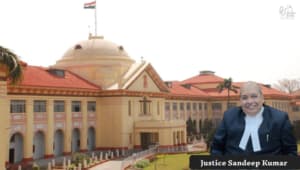The Supreme Court of India has lifted the restriction on YouTuber and podcaster Ranveer Allahabadia, granting him permission to air his show, The Ranveer Show, again. However, the Court mandated that his content must uphold standards of decency and morality, ensuring it is suitable for all age groups.
The restriction had initially been placed as a condition of Allahabadia’s interim protection from arrest, following multiple FIRs filed in Maharashtra, Rajasthan, and Assam over alleged obscenity in the controversial show India’s Got Latent.
A bench comprising Justices Surya Kant and N. Kotiswar Singh ruled that Allahabadia must not produce content violating moral standards and should refrain from commenting on sub-judice proceedings.
“One of them went to Canada and spoke about all of this. These young and oversmart ones think they know more than this... we know how to handle,”
Justice Kant remarked, expressing discontent over certain remarks made abroad. However, Allahabadia’s lawyer clarified that he was not linked to the individual responsible for those comments.
Senior Advocate Dr. Abhinav Chandrachud, representing Allahabadia, requested the Court to modify the earlier condition banning him from airing any shows. He assured the Court that his client would avoid profanity and focus on interviews with spiritual leaders and professionals. He also emphasized that Allahabadia employs over 280 people, making digital content creation his primary livelihood.
Solicitor General of India Tushar Mehta, representing the Union Government and the state governments of Maharashtra and Assam, revealed that he had personally viewed episodes of India’s Got Latent out of curiosity. He commented:
“The perversity in the program is of another level. Forget a man and a woman, even two men cannot sit together and watch the show.”
He further noted that Allahabadia had not fully cooperated with Assam Police’s investigation. However, his lawyer countered that he had responded to police notices but never received a reply regarding his appearance.
Recognizing that over 280 jobs depended on the show, the Court lifted the ban, subject to moral standards being maintained.
During the hearing, the Supreme Court also addressed the broader issue of regulating digital content, stating that online media should not operate without oversight.
“We don’t want a regulatory regime leading to censorship, but at the same time, it cannot be an uncontrolled space. Humor should be something the entire family can enjoy without feeling embarrassed. Using filthy language is not a talent,” observed Justice Kant.
Agreeing with this perspective, SG Mehta added:
“If you have to use vulgarity to make me laugh, then you are not a good comedian.”
The Court recorded its concern in the ruling:
“Some regulatory measures may be required for programs that do not align with the moral standards of our society. We have requested the Solicitor General to propose effective measures ensuring compliance with fundamental rights under Article 19.”
The Court also suggested that any proposed regulatory framework be placed in the public domain for discussion among stakeholders before implementation.
Background: The India’s Got Latent Controversy
The controversy erupted when clips from comedian Samay Raina’s YouTube show, India’s Got Latent, featuring Ranveer Allahabadia, Ashish Chanchlani, Jaspreet Singh, and Apoorva Makhija, went viral. The episode included explicit sexual references related to parents, sparking widespread backlash.
Following the outrage:
- Samay Raina publicly apologized and deleted all India’s Got Latent episodes.
- Ranveer Allahabadia also issued an apology, acknowledging his inappropriate remarks.
- On February 10, Guwahati Police filed an FIR against five YouTubers for promoting obscenity and engaging in sexually explicit discussions.
- Additional complaints were lodged by the Maharashtra Cyber Department and Jaipur Police.
Allahabadia and Chanchlani later petitioned the Supreme Court to quash or consolidate the multiple FIRs against them.
On February 18, 2025, the Supreme Court granted interim protection from arrest to Allahabadia while issuing notices to the Union of India, Maharashtra, and Assam. The Court also ruled that no additional FIRs should be registered against him based on the disputed episode.
During the hearing, Justice Kant strongly criticized Allahabadia’s language, calling it “dirty” and “perverted”.
“If this is not obscenity, then what is obscenity? The words he used would shame parents, daughters, and sisters. The entire society would feel ashamed. It reflects a perverted mindset.”
When concerns were raised regarding death threats to Allahabadia, the Court assured that state authorities would ensure his protection.
YouTuber Ashish Chanchlani, who was also part of the controversial episode, first approached the Gauhati High Court for anticipatory bail, arguing that he was merely a guest on the show and had no role in its editing or post-production.
The High Court granted him interim anticipatory bail, requiring him to cooperate with investigators. Later, he approached the Supreme Court to seek quashing or clubbing of multiple FIRs.
On February 21, 2025, the Supreme Court issued a notice on Chanchlani’s plea.
Case References:
- Ranveer Gautam Allahabadia v. Union of India & Ors. (W.P. (Crl.) No. 83/2025)
- Ashish Anil Chanchlani v. State of Guwahati & Anr. (W.P. (Crl.) No. 85/2025)















